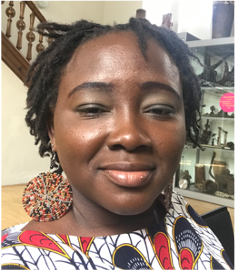Bio
Lydia Amoah is a doctoral candidate at the Institute of African Studies, University of Ghana, Legon, with research interests in gender, cultures and development, and gender and sexuality. As an affiliate and graduate assistant of the Centre for Gender Studies and Advocacy at the University of Ghana, Amoah has been teaching Introduction to Gender Studies for over 5 years. She has a Masters of Arts degree in African studies from the Institute of African Studies (2011), and a Bachelor of Fine Arts degree in theatre arts (2007) both from the University of Ghana, Legon.
Her PhD research explores how Akan Queenmothers (Ahemaa), as part of traditional authority in Ghana, employ indigenous methods of mediation, resolution, and adjudication in their traditional courts to avert and resolve conflicts in their communities. By employing an ethnographic study of the Asantehemaa’s court in Kumasi, Ghana, Amoah explores respondents’ notion of justice and how power and other structures influences their ability to seek justice. She also examines the role of the Ohemaa’s court as a space for championing human/women’s rights, and an institution for conflict resolution.
Amoah was a recipient of the Next Generation of Social Sciences in Africa Proposal Development Fellowship in 2016. In 2017, Lydia won a DAAD interdisciplinary Graduate School scholarship ”Performing Sustainability” Cultures and Development in West Africa with a focus on issues of peace and conflict resolution. She is also a Ghana Studies Association thesis grant recipient for 2019-2020.
Aside from teaching and research, Amoah enjoys playing badminton and has participated in tournaments on behalf of her university and club in Ghana.

